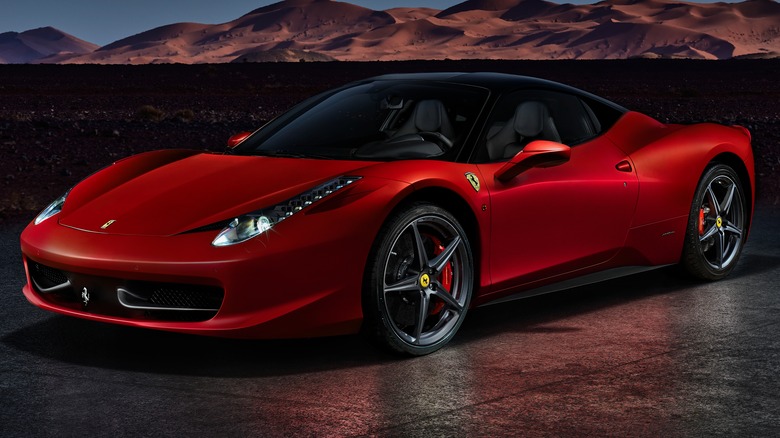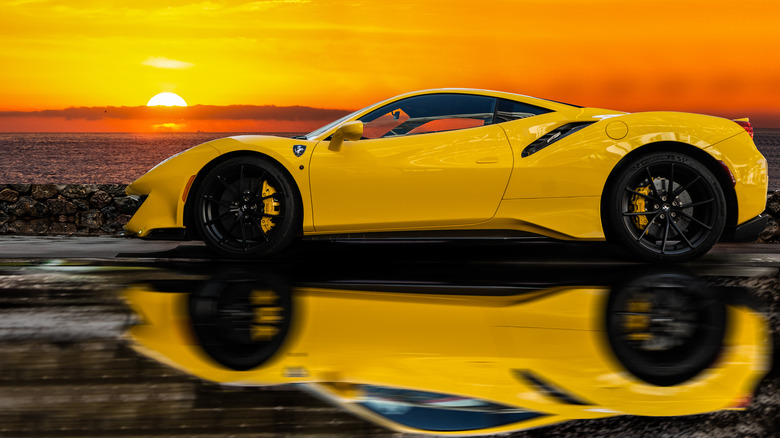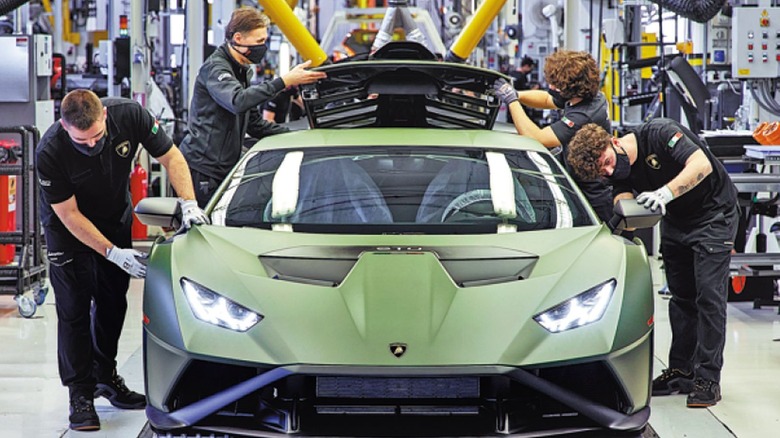The Reason Ferrari Employees Are Banned From Buying Their Own New Cars
Ferrari does things its own way. Some would say the Italian sports car maker has earned the right to do so, and they wouldn't be wrong. But Ferrari's way comes with a very long and uncompromising list of dos and don'ts that customers must adhere to in order to stay in the good graces of the men in Maranello. Perhaps actually working for the Prancing Horse might earn a person some perks that ordinary folk aren't privy to, such as the typical employee discount seen in most industries. That kind of thinking, while logical, couldn't be more wrong. In fact, the reality is quite the opposite.
According to one authorized dealer in the Chicago area, from 2011 – 2015, Ferrari sold an average of 7,393 cars each year. In 2016 and 2017, that average jumped to just over 8,200. The following year sales jumped by more than a thousand to 9,251. In 2019, Ferrari sold 10,131, the first time the carmaker ever sold more than 10,000 in a single year. That number settled back down the following year to 9,119. By comparison, the Ford Motor Company sold around 3.9 million cars around the world last year, making the number of vehicles Ferrari rolls out each year a minuscule drop in the bucket (via Statista).
Granted, the starting price for an affordable (relatively speaking) Ferrari Roma is around $220,000, whereas the most affordable Ford is the Maverick compact truck starting at a mere $20,995. Ferrari's F8 Spider retails with a starting price of around $280,000, while the 812 Superfast begins at around $335,000 and the 812 GTS at about $404,000. And if you're a big spender, the SF90 Stradale will set you back at least $625,000.
Riding along in my automobile... unless you're an employee
Based on information from ZipRecruiter, the average annual pay for a Ferrari employee in the United States sits at $59,453 yearly. If the pay scale in Italy is even remotely similar, it doesn't seem like any model of Ferrari — discounted or not — is within reach of most of its employees. And that's fine because employees are not allowed to purchase a new Ferrari. Ever.
That's according to the automaker's Enrico Galliera, who revealed the information during an interview spotted by The Drive. The big exception is that Formula One (F1) drivers, who are considered employees, are exempt from this and can purchase directly from the factory because they're considered global superstars who make for good brand ambassadors. The mandate sounds draconian, to be sure.
Still, it makes complete sense with a global customer base that constantly outweighs the limited number of cars the auto manufacturer kicks out every year. It boils down to the fundamentals of supply and demand. Ferrari makes something universally wanted, allowing it to attach a very high premium to that product. Despite the (exhaust) pipe dreams of would-be employees, selling said product at a reduced price does not make good business sense, nor does allowing employees to get first dibs on cars that clients are waiting for.
As long as Ferrari has professional athletes, movie stars, musicians, and world-famous car enthusiasts (with the financial means) on its waitlist, employees shouldn't hold their breath at ever getting a shot at a brand new ride. The rule, however, does not apply to used Ferraris, so there's still hope of riding off into the sunset in a pre-owned, secondhand model. Driving around in a lightly used Ferrari shouldn't sully one's reputation too much — it's still a Ferrari, after all.
All work and no perk makes for grumpy employees
Ferrari isn't the only high-end sports car manufacturer that puts the brakes on its employees in some form or fashion.
While there doesn't appear to be any other "no car buying" edict quite like The Prancing Horse's in the industry, there are other rules employees must follow. For instance, Porsche and Lamborghini don't allow their employees to donate to any cause or organization without going through a rigorous internal approval process. They try to avoid a conflict of interest like criminals avoid the law. Both have similar rules about engaging on social media. Of course, most companies generally have social media rules and regs in the employee handbook.
But it's not all work and no play. Porsche is said to give a three to four-percent discount on vehicles (except limited production cars). In 2017, Porsche gave every employee a bonus of 9,111 euros (a nod to the 911), the equivalent of $9,822 at the time of publication. Meanwhile, Lamborghini offers homemade honey to its employees for Christmas, which comes directly from its own apiary that houses some 600,000 bees.
And Ferrari had such a good 2021 — shipping 11,155 cars — that it doled out a record bonus of 12,000 euros (roughly $12,420 at the time of this writing) to all its employees. They may not be able to buy the car of their dreams with it, but it's still not a bad perk.


